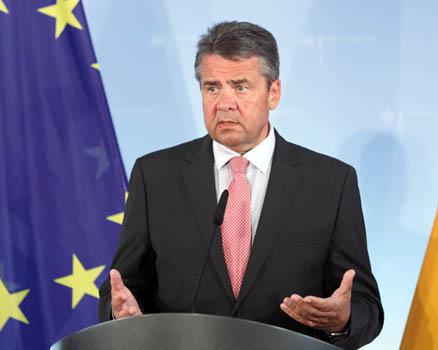You are here
Germany vows economic steps against Turkey as row escalates
By AFP - Jul 20,2017 - Last updated at Jul 20,2017

German Foreign Minister Sigmar Gabriel addresses a press conference at the foreign ministry in Berlin, Germany, on Thursday (Anadolu Agency photo)
BERLIN — Germany on Thursday vowed stinging measures hitting tourism and investment in Turkey and a full “overhaul” of their troubled relations, signalling its patience had snapped after Ankara’s arrests of human rights activists.
The government stepped up its travel advisory for the NATO ally as Foreign Minister Sigmar Gabriel warned it could no longer guarantee its citizens’ safety in the face of “arbitrary” mass arrests, a step set to hit a sector crucial to Turkey’s ailing economy.
A day after his ministry summoned Turkey’s ambassador, Gabriel interrupted his holiday and returned to Berlin to deliver his unusually strong comments towards President Recep Tayyip Erdogan.
Relations between Turkey and Germany, home to 3 million ethnic Turks, have been badly strained, particularly since the failed coup a year ago against Erdogan.
Gabriel said Germany would review state guarantees for foreign investment in Turkey and urge businesses not to put their money there, and also reconsider its support for billions in EU financial flows earmarked over coming years for the long-time aspirant to membership of the bloc.
A Social Democrat, Gabriel made clear he was speaking for the coalition government led by conservative Chancellor Angela Merkel, and her spokesman soon tweeted that the steps were indeed “necessary and indispensable”.
Gabriel recalled that Turkey, having long seen itself as “a member of the European family”, had levelled Nazi jibes at Germany, and accused Erdogan of worsening a crisis that Berlin had repeatedly sought to ease through dialogue.
He accused Erdogan of trying to muzzle “every critical voice” with mass arrests in sweeping crackdowns over the last year.
Gabriel stressed that Germany still wanted to rebuild relations with its long-time ally but that first Erdogan’s government must “return to European values”.
Turkey’s presidential spokesman Ibrahim Kalin accused Germany of “great political irresponsibility” in stepping up its travel warning and said: “We do not accept this.”
He pointed to Germany’s election in September, saying: “It’s unacceptable to try and damage economic relations, try and arouse doubts in the minds of German investors, for the sake of petty electoral calculations.”
Activists held ‘hostage’
A Turkish court on Tuesday ordered six rights activists to remain in custody for allegedly aiding a “terror” group — among them Amnesty International’s Turkey director Idil Eser and Berlin-based activist Peter Steudtner.
Turkey in February arrested, on similar charges, German-Turkish journalist Deniz Yucel of Die Welt and is holding several other German citizens.
Erdogan has demanded Germany extradite people he blames for conspiring against him, mostly alleged followers of US-based Muslim cleric Fethullah Gulen whom he accuses of orchestrating the coup, a charge Gulen denies.
Germany has granted asylum to some Turkish dissidents, journalists and military officers who feared being swept up in the post-coup arrests.
German politicians and media have accused Erdogan of detaining German citizens as “hostages” to trade for Turks in Germany, but Gabriel said he “had heard of no official exchange offer”.
News weekly Die Zeit said Ankara’s blacklist also includes large German companies such as Daimler and BASF, claims dismissed as “absurd” by German security sources.
Gabriel, without referring to those claims, said that “you can’t advise someone to invest in a country where there is no legal certainty and even completely innocent companies are linked to terrorism”.
Escalating row
German-Turkish relations have steadily deteriorated in recent years, amid a free speech dispute centred on a German TV comedian and a German parliamentary vote on the sensitive historical question of the Armenian genocide.
Erdogan has fumed over Germany’s decision to deny him and other Turkish politicians opportunities to campaign in Germany, home to the largest Turkish community abroad due to its “guest worker” programme of the 1950s and 1960s.
The NATO allies have also clashed over thwarted visits by German lawmakers to troops stationed at Turkish bases.
Germany last month pulled out its 260 military personnel from Turkey’s Incirlik base, from where a multinational coalition is fighting the Daesh extremist group in Iraq and Syria, and redeployed them in Jordan.
The spat has cast clouds over Turkey’s long-term push to join the European Union, and threatened a 2016 deal between Ankara and the EU that has stemmed the mass influx of migrants and refugees into the block.
Top-selling Bild daily cheered that Gabriel “has shown Erdogan what happens when you break the rules. Finally! That took far too long! Hopefully he will get the message”.
Several weeks ago, Erdogan told Die Zeit weekly that if more German tourists shun the popular holiday destination, Turkey would simply seek to attract more visitors from Russia, now the number two country of origin.
Related Articles
GOSLAR, Germany — Germany and Turkey's foreign ministers on Saturday agreed to pull out all the stops to improve ties that have soured due t
ANKARA — Germany has no choice but to pull its troops out of the key Turkish airbase of Incirlik, after failing to reach agreement with Anka
BERLIN — Germany said on Wednesday it was considering moving the roughly 250 troops deployed at Turkey's Incirlik base to help in the fight













